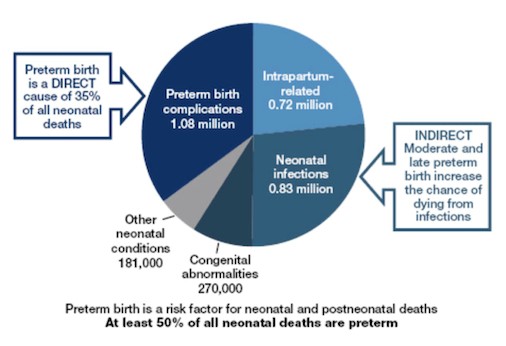A classic question asked at family gatherings to 20-year-old women would be, “At what age do you plan to marry and have children?” As women become more educated, they tend to choose to have children at an older age. The Indonesia Demographic and Health Survey in 2017 has shown that women who reach university-level education, on average gave birth to their first child at 27 years old, while women who only reach elementary school, on average had their first child at 20 years old.1 While delaying pregnancy is beneficial for the productivity of the women workforce, it also raises another concern for women’s reproductive health: prematurity risks at advanced maternal age.
What is advanced maternal age?
Advanced maternal age (AMA) is defined as women who give birth after 35 years of age. This growing trend of delaying pregnancy is occurring in many developed countries. In England and Wales, only 6% of births in 1980 came from women aged 35 years and above, while in 2013 the occurrence increased to 20% of births.2 In Asia’s higher-income countries, mean maternal ages reported were 31 years in South Korea, 30.5 years in Singapore, 30.3 years in Japan, and 29.8 years in Hong Kong.3 While numbers have shown that delayed pregnancy is more prevalent in developed countries, developing countries should also take this concern into account as their economy will only strengthen and will likely encounter this problem more often eventually.
What is premature birth and why is it dangerous?
Infants born prematurely were conceived for under 37 weeks. Prematurity is dangerous due to its numerous complications, including birth defects. Below are the complications associated with prematurity:4
- Respiratory distress syndrome
- Hyaline membrane disease
- Bronchopulmonary dysplasia
- Pneumothorax
- Pneumonia/sepsis
- Patent ductus arteriosus
- Necrotising enterocolitis
- Retinopathy of prematurity
- Intraventricular haemorrhage
- Periventricular leukomalacia
- Cerebral palsy
Above may be the reasons why premature birth is a direct cause of 35% of neonatal deaths in 193 countries in 2010 (Figure 1).5

Is delayed pregnancy associated with the risk of prematurity?
The association between these two variables is still controversial. However, many studies have shown that they are true. In a 2018 large cohort study in Canada by Fuchs et al., advanced maternal age is linked with a higher risk of premature birth. This may be due to certain medical conditions associated with advanced maternal age, such as chronic hypertension, the use of assisted reproduction technologies (ART), pregestational and gestational diabetes, invasive procedures, and placenta previa.6 A cross-sectional Japanese study by Ogawa, et al. in 2017 also shows a similar result, in which the studies show that women aged 45 years and above have higher risks for adverse birth outcomes, including premature birth.7
What can we do to prevent it? Every woman has a right to choose when to have children. However, they should be aware of their risks of delaying pregnancy to the age of 35 years and above. Women choosing to conceive at an advanced age should be given better antenatal care to prevent and anticipate the risks mentioned above. Younger women should also be educated of the complications that might arise from delaying pregnancy, as this allows more thorough family planning.
Author:
Kezia Adelize Aurelia Junus
Faculty of Medicine and Health Sciences Atma Jaya Catholic University of Indonesia
AMSA Indonesia
